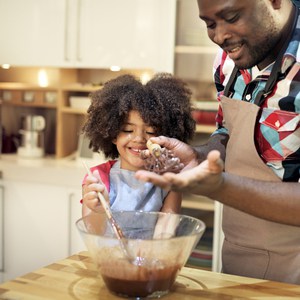Kids in the Kitchen: Tips for Staying Safe
 Cooking is an important practical skill that can save money and help kids eat healthier and create a deeper connection with their families. Indeed, cooking can be a labor of love. And whether your children want to treat you to breakfast in bed on your birthday, prepare a kid-cooked Mother’s or Father’s Day brunch, or help with holiday meals and Sunday dinner after church, here are some tips to keep them safe in the kitchen.
Cooking is an important practical skill that can save money and help kids eat healthier and create a deeper connection with their families. Indeed, cooking can be a labor of love. And whether your children want to treat you to breakfast in bed on your birthday, prepare a kid-cooked Mother’s or Father’s Day brunch, or help with holiday meals and Sunday dinner after church, here are some tips to keep them safe in the kitchen.
Start With Home Maintenance
Make sure your home’s smoke detectors are in working order. Test them once a month and replace their batteries twice each year. Perform periodic checks on your carbon monoxide detector as well. Even if you don’t think your home is in danger of harboring high carbon monoxide levels, common appliances including gas stoves and ovens can be a source of the dangerous colorless, odorless gas.
Stock your home with a fire extinguisher and make sure you know how to use it. Read the operating instructions before an emergency since there will probably not be enough time to peruse the fine print when you actually need to use the extinguisher. For example, the instructions explain if the model is suitable for grease and electrical fires. It’s also important to note fire extinguishers should be kept out of kids’ reach and only used by people who can safely operate them.
Reinforce Rules for Every Recipe
Start slow with age-appropriate tasks. For example, younger children should use wooden or plastic spoons and shatter-proof bowls and be warned against touching the stove or oven. Older children may be mature enough to start learning knife skills, but adults should show them proper techniques and supervise them closely in the kitchen.
In fact, kids should get permission to work in the kitchen, regardless of the recipe. And they should have adult supervision if a task requires using knives, the stove, or other appliances that could be dangerous. Every kitchen session should also start at the sink, where cooks of all ages wash their hands thoroughly. Remind young cooks to wash their hands after handling meat, poultry, eggs, and fish as well.
Teach Stove Safety
Cooking is the leading cause of house fires and home fire injuries, according to the National Fire Protection Association. So, when cooking with kids, emphasize the importance of never leaving the kitchen when frying, grilling, and broiling on the stove. Cooks should also check the oven regularly when it’s in use and set a timer to remind them when their goodies are good to go. And, even if you’re a seasoned chef, lead by example and follow these tips yourself.
Teach aspiring chefs to turn pot and pan handles toward the back of the stove so they’ll be less likely to knock them over. Also remind kids to keep flammable objects, such as oven mitts or dish towels well away from the stove. Finally, tell burgeoning bakers and chefs they should never poor water on a grease fire since that will only make the flames spread faster. While adults should handle emergencies such as grease fires, kids should be instructed on how and when they should step in and call 911 in case of an emergency in the kitchen or anywhere else.
Cooking can be a great way to connect with friends, family, and community. Start with these basics, and you’ll have kids in the kitchen whipping up tasty treats for Sunday School parties, family functions, and holiday gatherings in no time. Just make sure you also teach them how to do the dishes afterward!
See a list of all articles Daniel has written on Sunday School Zone.



